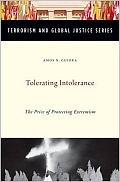| |||||
• polskie
• Zamów informacje o nowościach z wybranego tematu • kontakt |
TOLERATING INTOLERANCECUIORA A.N.wydawnictwo: OXFORD UNIVERSITY, 2014, wydanie Icena netto: Tolerating IntoleranceOver the years, numerous tragic events serve as a reminder of the extraordinary power of extremism, both on a religious and secular level. As extremism confronts society on a daily basis, it is essential to analyze, comprehend, and define it. It is also essential to define extremism narrowly in order to avoid the danger of recklessly castigating for mere thoughts alone. Tolerating Intolerance provides readers with a focused definition of extremism, and articulates the tensions faced in casting an arbitrary, capricious net in an effort to protect society, while offering mechanisms to resolve its seemingly intractable conundrum. Professor Guiora examines extremism in six different countries: Germany, Israel, the Netherlands, Norway, the United Kingdom, and the United States through interviews with a wide range of individuals including academics, policy makers, faith leaders, public commentators, national security and law enforcement officials. This enables both an in-depth discussion of extremism in each country, and facilitates a comparative analysis regarding both religious and secular extremism. Preface Introduction 1. Defining extremism 2. The dangers extremism poses to society 3. Multiculturalism 4. Secular extremism and religious extremism: the differences, causes, and role of religion in fomenting extremism 5. The power of the internet and social media in facilitating extremist movements and ideas 6. Contemporary social tensions 7. The power of 'hate speech' and what limits should be imposed on free speech in the context of extremism 8. Looking forward Index 240 pages, Hardcover Księgarnia nie działa. Nie odpowiadamy na pytania i nie realizujemy zamówien. Do odwolania !. |


